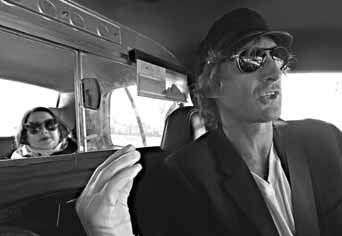The cabby hears all, and turns it into art
Updated: 2013-03-31 08:21
By Matt Flegenheimer (The New York Times)
|
|||||||||||
|
Victoria Reis listens to Daniel J. Wilson's audio collage from the back of his cab. Hiroko Masuike / The New York Times |
His career as a New York City taxi driver began with an overnight shift, a creative urge, and a brazen interpretation of privacy laws.
It compelled him, most recently, to cruise between art shows along Manhattan's West Side, hoping to impress upon the city's cultural elite that with the right soundtrack, even a yellow cab could be transformed into a gallery space.
And in between, Daniel J. Wilson - an artist, a documentary filmmaker and, since 2011, a licensed cabby from Brooklyn - secretly recorded the conversations of his passengers, assembled the highlights into an audio collage of the back-seat musings and installed the final product in his taxi, playing the clips for his riders, who listened anxiously for familiar voices.
"It's this world where people act like you don't exist, even though you're three feet away," Mr. Wilson, 35, said from the front seat of his cab recently. "You get this fragment of a person."
Of course, unlike a bartender, who is expected to at least feign interest in the tales told by his regulars, a taxi driver is rarely privy to explosive confessions and noisy breakups, office gossip after work and whiskey-induced phone calls before dawn.
Reality shows aside, whom would a cabdriver ever tell?
Mr. Wilson's 37-minute piece, called "9Y40," after the medallion number of the taxi he used during the recordings, draws on a four-week period spent driving on the 5 p.m. to 5 a.m. shift. It includes an observation on fashion trends ("antlers are so hot right now"), introspection from a bachelor ("I am extremely datable and extremely interesting, but I wouldn't actually date myself") and a woman's insistence that her sister is too well-liked.
"Kelly's not miserable and alone," the woman said, slurring slightly. "She has a wonderful husband; she has friends. That's what's sick."
There is also a good deal of profanity.
What is not certain is whether Mr. Wilson's recordings were obtained legally. Though New York is a so-called one-party consent state - conversations can be lawfully recorded if only one party is aware of the device - legal experts say Mr. Wilson's interactions with his passengers may not constitute conversations. He often took pains to remain silent, he said, letting his riders talk without provocation.
Before presenting his work, Mr. Wilson sought the counsel of Volunteer Lawyers for the Arts, he said. He was told that while passengers who heard their voices in the piece could sue to prevent him from using the recording, he was unlikely to face serious liability.
The city's Taxi and Limousine Commission would not say whether the recordings violated any rules, but David S. Yassky, the taxi commissioner, said Mr. Wilson showed "very poor judgment." He added that the city would decide whether a rule should be drafted to address similar circumstances in the future.
Other reviews have been more charitable, though Mr. Wilson has presented his work to a handpicked audience. He recently drove his cab exclusively between art fairs, pegging his efforts to Armory Arts Week, which was held from March 5 to 10.
On a recent Saturday, he played his work for passengers from a speaker system assembled in the back seat of his cab and refused to charge, for the ride or the show.
One rider, Victoria Reis, 42, who was visiting from Washington to attend the Armory shows, called the project "the least pretentious and most experimental" she had seen all week.
She tipped him $20.
The New York Times
Today's Top News
Police continue manhunt for 2nd bombing suspect
H7N9 flu transmission studied
8% growth predicted for Q2
Nuke reactor gets foreign contract
First couple on Time's list of most influential
'Green' awareness levels drop in Beijing
Palace Museum spruces up
Trading channels 'need to broaden'
Hot Topics
Lunar probe , China growth forecasts, Emission rules get tougher, China seen through 'colored lens', International board,
Editor's Picks

|

|

|

|

|

|






